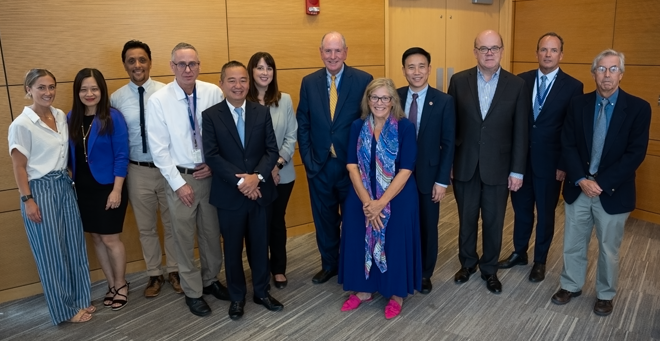UMass Chan hosts research faculty, students from Hanoi Medical University
Posted in UMass Chan News on September 11, 2023
Preventive and population medicine training and research collaboration backed with $9 million in NIH funding since 2016

Twenty faculty, graduate students and postdoctoral fellows from Hanoi Medical University and Hanoi Medical University Hospital will be attending seminars, giving lectures and working closely with UMass Chan Medical School faculty on campus for the month of September. The exchange program is part of an ongoing research collaboration between Hanoi Medical, the Vietnamese Ministry of Health and UMass Chan to curb the rising burden of noncommunicable diseases, such as cardiovascular disease, high blood pressure, cancer, chronic lung disease and diabetes, in Vietnam.
Twenty faculty, graduate students and postdoctoral fellows from Hanoi Medical University and Hanoi Medical University Hospital will be attending seminars, giving lectures and working closely with UMass Chan Medical School faculty on campus for the month of September. The exchange program is part of an ongoing research collaboration between Hanoi Medical, the Vietnamese Ministry of Health and UMass Chan to curb the rising burden of noncommunicable diseases, such as cardiovascular disease, high blood pressure, cancer, chronic lung disease and diabetes, in Vietnam.
As part of the exchange program, distinguished scholars Quoc Hung Doan, MD, vice president of Hanoi Medical University and chair of surgery; and Lan Hieu Nguyen, MD, director of Hanoi Medical University Hospital, director of the Cardiac Care Center at Hanoi Medical and Congress Person in the Vietnamese Socialist Party, met with faculty and toured UMass Chan. While on campus, they bestowed Robert Goldberg, PhD, professor emeritus of population & quantitative health sciences, the title of honorary professor at Hanoi Medical University in a celebration of his career and collaboration.
Led by Jeroan Allison, MD, MS, chair and professor of population & quantitative health sciences, and Hoa T. Nguyen, MD, MS, PhD, associate professor of population & quantitative health sciences, the program has garnered more than $9 million in various grant funding from the National Institutes of Health, including the John E. Fogarty International Center for Advanced Study in the Health Sciences, since 2016. A $1.2 million grant from the National Heart, Lung and Blood Institute will fund postdoctoral and master’s training in epidemiology as well as research design and implementation. Meanwhile, a five-year, $2.1 million grant will support an intervention meant to reduce the rate of hypertension among rural residents with HIV.
“From an epidemiological standpoint there is a tsunami of noncommunicable diseases coming to Vietnam,” said Dr. Allison. “It’s estimated that more than 50 percent of rural residents suffer from hypertension, but only half of them know and an even smaller percentage are receiving medication and have the disease under control.
“Working with the Vietnamese Ministry of Health and our colleagues at the Hanoi Medical University and Hospital, we’ve created a powerful research collaboration that has already successfully instituted a smoking cessation intervention in rural communities. Our goal is to continue our partnership to address disease outcomes that can have a significant impact on health disparities in rural and urban areas of Vietnam,” said Allison.
Over several decades, as Vietnam has modernized, investing in basic infrastructure such as sanitation, the incidence of infectious diseases such as cholera, tuberculosis, malaria, HIV and encephalitis have declined. However, the mortality rates for chronic noncommunicable diseases such as diabetes, cancer, high blood pressure, lung disease and cancer are on the rise.
“There’s a transition happening in Vietnam right now,” said Dr. Hao Nguyen. “With access to modern food and a contemporary lifestyle that includes activities such as smoking, the cause of mortality is changing, but the health care system hasn’t been able to keep up with these changes. UMass Chan and our colleagues in Vietnam are working to craft interventions that can help address these chronic diseases.”
Allison, Hao Nguyen and colleagues are working with Vietnamese health care providers and officials to institute a storytelling approach, in which recognizable members of the community provide positive messages aimed at controlling hypertension through diet and medication adherence among rural residents with HIV. Based on similar programs designed by UMass Chan, this type of intervention offers a unique opportunity to communicate positive disease management choices in a culturally appropriate context.
A similar program, aimed at smoking cessation among rural residents in Vietnam, has been remarkably effective at helping people quit smoking. “The interest we’ve had among patients has been amazing,” explained Allison. “They line up to take part in the clinical trials and the follow-up rates after the first year have been better than 95 percent.”
Allison explained that the intervention is designed specifically for the targeted population by Vietnamese health professionals. “We’re not the experts,” said Allison. “This is a collaborative approach where we provide the tools that health care professionals need to design and implement these clinical trials.”
“The health system in Vietnam has been very successful,” said Dr. Doan. “The emergence of noncommunicable diseases among our population, however, is an emerging challenge. To better treat our patients, we must equip ourselves to do clinical research and design treatments that work for our people. The partnership with UMass Chan and Dr. Allison is an important part of improving our health care capacity for rural patients.”